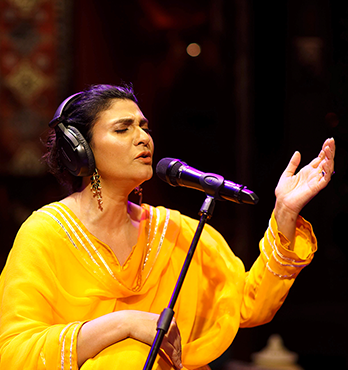Fariha Pervez

by Aliya Farrukh Shaikh
When Fariha Pervez’s sixth studio album was scheduled to release, her producer decided that it would be named Passion. She didn’t like the name at first and asked him to change it, but the name ended up staying — “You won’t understand it now”, he told her at the time. 14 years and an extended hiatus later, Fariha realizes that he was right. “After all this time, I’ve realized that it really is my passion. When I sing a classical song or a thumri, I feel it in my heart. It’s an unexplainable happiness.”
Fariha’s inclination towards music was an automatic response to her parent’s love for it — she grew up listening to her father’s voice as he sang his favourite songs around the house, a voice she still finds beautiful. Her mother, a fan of the qawwali genre, would listen to Nusrat Fateh Ali Khan while tending to house chores and Fariha would quickly pick up the beat and the words, singing along to her mother’s favourites. “I was so used to listening to classical music as a child. Those songs are etched in me,” she says, explaining her transition from pop to more classical and Sufi-infused music.
Fariha’s father was the greatest musical influence in her life and also her most dedicated supporter. Her earliest memories include singing filmi duets with her father when she was three years old. Fariha remembers singing Pervez Mehdi and Reshma’s Goriye Mein Jana Pardes — her father would sing out the titular verse, “goriye mein jana pardes,” and Fariha, in her toddler voice, would sing back, “ mein jana tere naal, goriye mein jana pardes.” “My father used to sing with me like we were decades-old professional singers,” she remembers fondly, “I knew even then that I am a singer. I knew it.”
Not known to be a mischievous child, always shy, always reserved, and always steering away from outdoor activities, Fariha always sought refuge in music. Her play was her singing and it wasn’t long before her father bought her first instrument for her birthday: a little keyboard. Even now, she says, “If I’ve ever felt or expressed an urge to go somewhere in life, or do to something, it’s always been music.”
Her father didn’t only help Fariha find her voice but also pushed her to pursue what he himself could not. His family did not let him sing, but he wouldn’t do the same to his daughter, who he encouraged to fulfill a dream he himself could not. He fought with his own relatives, insisted that Fariha do what she was born to do and, years later, when she thought her passion was being taken away from her, he stood by her side and walked her through the alleys of uncertainty and unfamiliarity.
Fariha’s career had initially started in front of the camera — but she never imagined that one day, she’d become a famous singer. Her first encounter with fame and the industry was as a child artist in Khalil Ahmed and Roohi Ijaz’s drama’s, which aired on PTV. With time, she slowly paved a way for herself by taking up more acting roles, co-hosting a popular children's music program named Aangan Aangan Taray, and singing jingles for local commercials. As her popularity grew in the small circle of the industry, and calls offering work started pouring in, Fariha’s uncertainty seeped in. “I was very young and very scared. Suddenly, it all seemed very overwhelming and difficult”, she says.
Even during this phase in her life, one marred with confusion and uneasiness, Fariha’s father didn’t let go and continued to support her. She thought he would tell her to put to rest the one thing he himself had passed on to her — out of fear of society and the preconceived notions it has of women in the music industry in Pakistan. Instead he told her, “Even if I have to go with you to auditions and shows, it’s okay, I’ll do it. I’ll make sure I’m there with you.”
Perhaps, her father’s undying belief in her talent was something she needed to be the resilient artist she is today –– who, even years later is still finding and learning ways to reinvent herself. In the last 8 years, Fariha has resumed her classical training, feeding the passion that has been driving her forward since she was a child. When she invited an ustad to solidify her musical theory he was surprised and said; “You are Fariha Pervez, why would you want to acquire training?” But Fariha is always learning, always growing. She says, “We are nothing. Just because we gain a little fame doesn’t mean that our education ends. Life is all about learning.”
It almost seems as if her father did not only pass his talent to her but also his passion. Even now, when Fariha talks about her music and the hiatus she took, she explains her return as a consequence of the intensity of her passion. The fame doesn’t matter to her, nor does the opinion of the audience — her music is her catharsis and the reason for her return is her passion. “Music is a part of me and keeping it away for so long was very difficult and painful”, she says. There is no regret when she says this but her adoration for her craft is apparent. Her love for music drives her - it strengthens with every session with her ustad, when she watches Youtube videos demonstrating raags, and after every conversation with her father; who is and will always be a reminder for her to keep alive what exists inside her.
